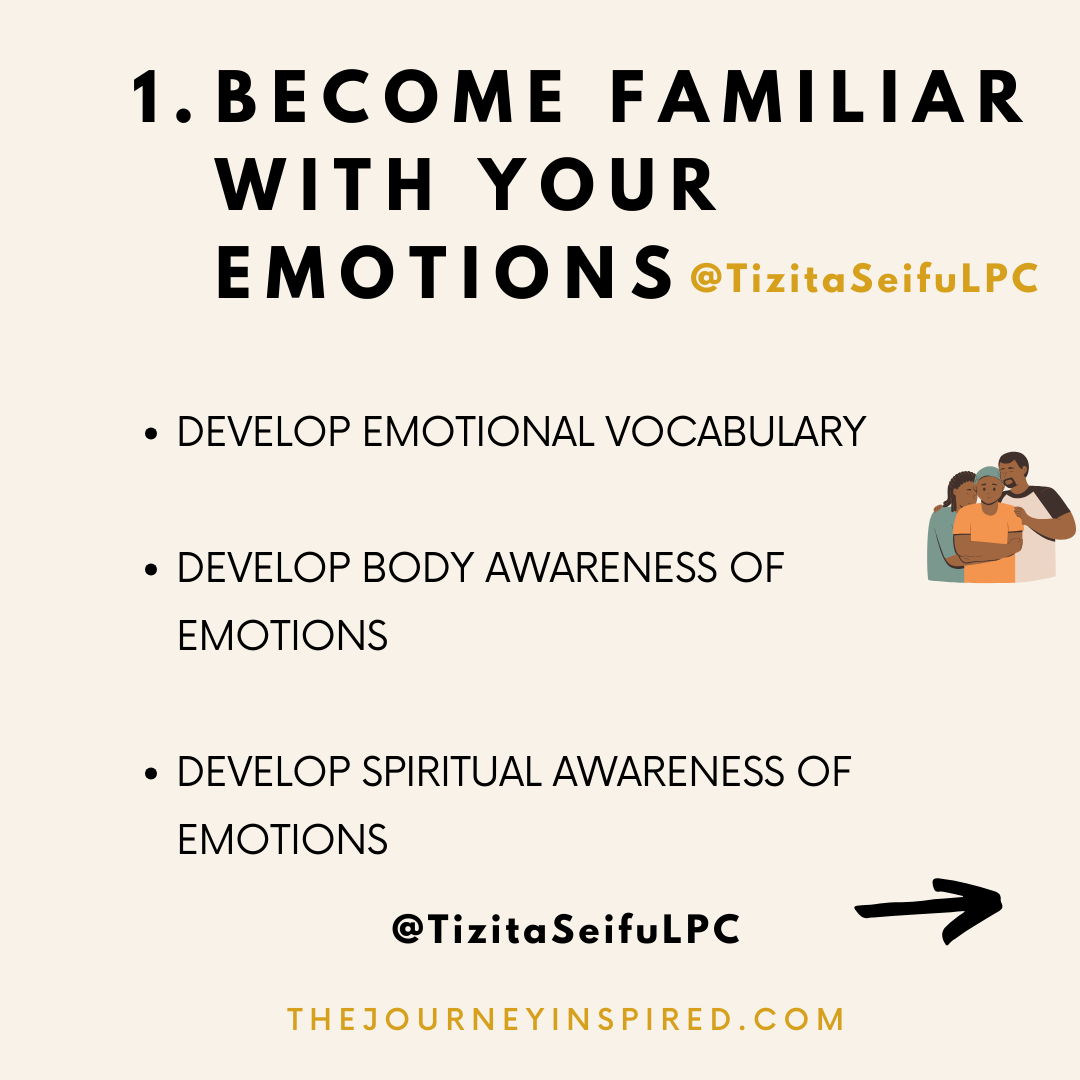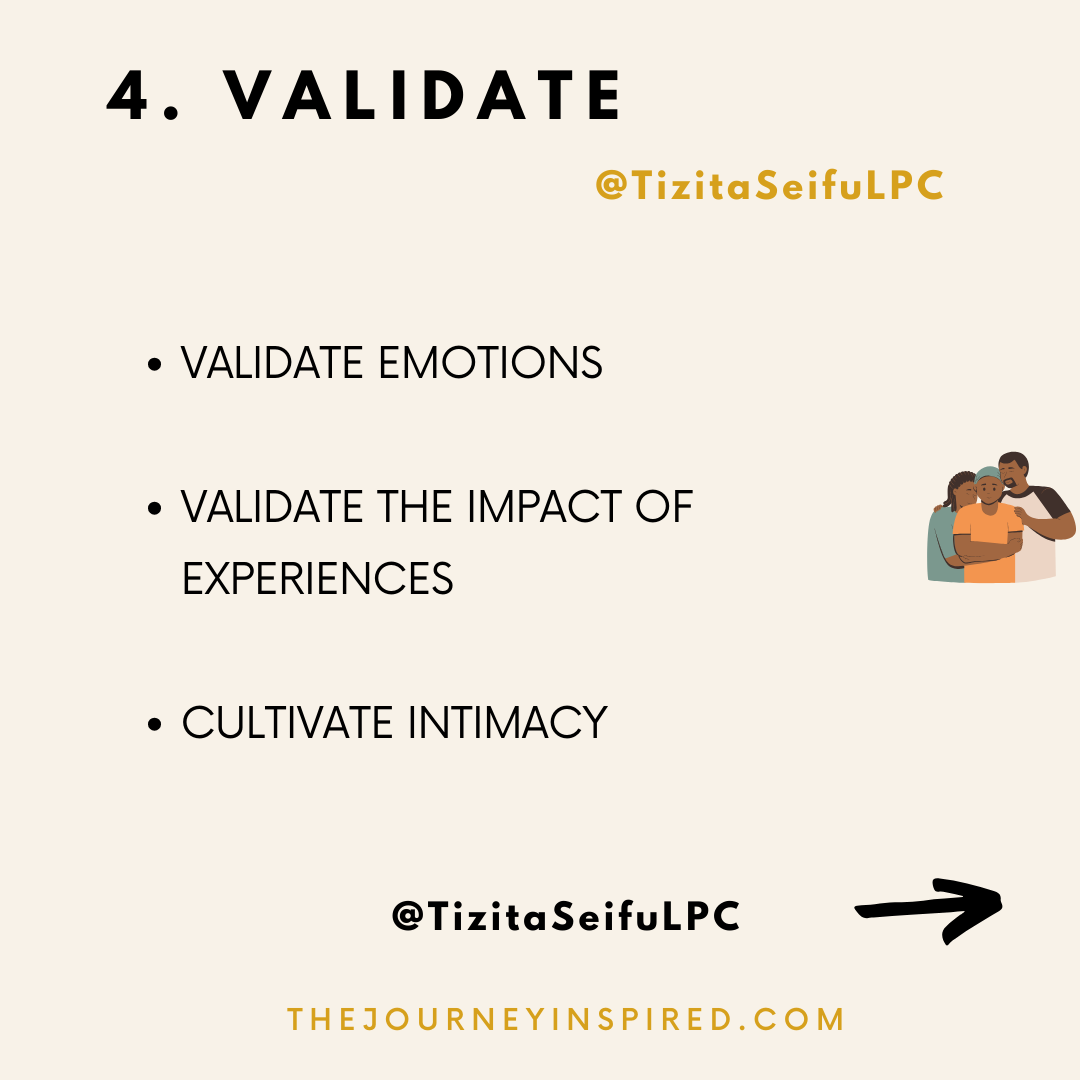Build Emotional Intelligence: 6 Tips
6 Tips: Build Emotional Intelligence:
Parent/Child
by Tizita Seifu MA, LPCS
Healthy Emotion Management increases Success
Noticing and managing difficult emotions is challenging for adults and children regularly leaving us more vulnerable to stress, sickness and overwhelm, but increasing emotional intelligence increases self awareness, intimacy, and the ability to navigate life in satisfying ways.
Emotional intelligence includes the ability to notice, understand and manage emotions in healthy, helpful and effective ways.
Become Familiar with Emotions:
Develop Emotional Vocabulary
Teach your child about emotions using simple language and examples, helping them notice, identify and label their feelings, such as the 6 core human emotions: Powerful, Peace, Joyful, Sad, Mad and Scared.
Develop Body Awareness of Emotions
Have you ever noticed the body sensations you experience related to the core human emotions? Power may feel like energy. Peace may feel like an increased ability to experience rest in your mind and ease to fall asleep and stay asleep. Sad may feel like physical fatigue or feeling disconnected from our body or the present. Mad may feel like tension in your stomach, chest or arms. Noticing bodily sensations can help us more quickly identify our emotions and the experiences that contribute to those feelings.
Develop Spiritual Awareness of Emotions
Engage in honest conversation with God, and teach your child to also do the same in ways that are honest and helpful. Be honest and transparent with God about how you feel. Ask God to help you identify and manage your emotions in healthy ways. While God recognizes the great faith of children, also teach your children to take responsibility and entrust their concerns to God.
2. Engage and Model Healthy Emotional Expression:
Engage your emotions in healthy ways and model healthy emotional expression by expressing your own feelings openly and managing them in helpful and constructive ways. This helps:
normalize feeling feelings
reduces anxiety about feelings
helps your child feel less scared with feeling their own feelings
makes them feel more comfortable with being honest with you about their feelings
helps your child understand that feelings are generally normal and temporary
3. Emotion Soothing Activities/Emotionally Regulating Activities
Self Regulation: Personal Emotional Calming
Practice emotion regulation which includes soothing techniques that bring relief in times of stress and upset. Become familiar with noticing your emotions, remaining curious about the contributors to your emotions, and soothing your discomfort in healthy and intentional ways, such as engaging in meaningful activities, communicating and pursuing your needs, setting boundaries and engaging in a healthy balance of personal responsibility and faith that also recognizes your daily personal limits.
Co-Regulation: Calming Child Emotions Together
Help your child learn to sooth their discomfort by engaging in soothing and comforting activities together, such as taking slow, deep breaths, using attuned statements such as “I see you are sad”, physical movement which helps move stress out of the body, or prayer. When your child becomes calmer, you can help guide them in developing their problem solving skills where appropriate. Coregulation increases confidence and empowerment in stressful times.
4. Validate:
Validate you and your child’s emotions and experiences, such as by acknowledging the unique empowering and challenging experiences they may face as part of Black, immigrant, or Christian communities, such as “It makes sense that you would feel sad that (insert their reported experience that made them feel sad).” This helps increase understanding and comfort with their experiences and their impact. This also helps create greater personal and relational familiarity and intimacy. You can validate your child’s emotions while disagreeing with their choices, when an inappropriate choice has been made.
5. Encourage Curiosity:
Encouraging open dialogue by asking open ended questions, listening, and responding calmly help provide a safe space for your child to explore experiences and questions of purpose, and belonging.
6. Check in with a Child Therapist
Most children only receive therapy after they get in trouble with an adult. I would be glad to partner with you to ensure you have the tools for health and success.
For more information on how to build emotional intelligence to notice and manage emotions in healthy ways that lead to desirable outcomes, feel free to schedule an appointment with me:
Hi I am Tizita, a Board licensed Therapist in private practice providing adult and child therapy specializing in mental wellness, anxiety, depression, career and workplace, Christian faith, culture and race, and parent-child relationships.
Sign up for my newsletter below if you want to receive more resources like this.






